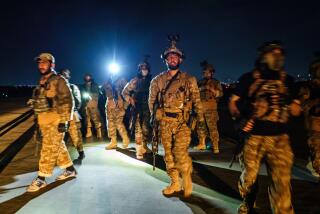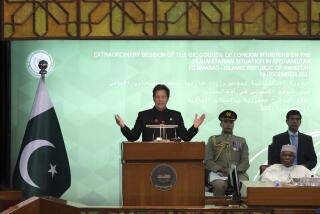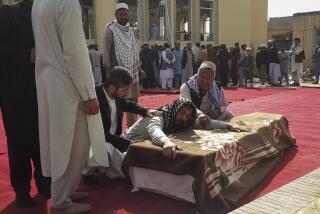Afghan Successes, and Shortfall, on Display
- Share via
WASHINGTON — Supported by 18,000 U.S. soldiers and billions of dollars in aid, Afghanistan’s interim government depends like few in the world on the United States. This week, the Bush administration is showing that it is happy to accept a little help in return.
President Bush will escort Afghan President Hamid Karzai to a Rose Garden news conference today as part of the visiting leader’s lap around official Washington that is aimed at building public support for Afghanistan and showing what Bush’s team has accomplished overseas. At the White House, the photogenic interim head of state is a reminder of what the administration has done in its war on terrorism -- and a suggestion of what it may be able to do in Iraq.
Administration officials “love Karzai as a guy who shows that their plans” can succeed, said one U.S. official. “Here’s a democrat who Americans feel great about working with.”
Yet critics note that the visit comes at a time when the fragile Afghan government is also encircled by problems -- insurgent attacks, unruly warlords, exploding drug cultivation and allegations of government corruption.
The visit is “great on one level, since Afghanistan deserves all the attention we can give it,” said a Democratic senior Senate aide, who believes the administration is doing less than the minimum needed to strengthen the Afghan government. “On the other hand, if you’re paying close attention, you realize this is an ongoing eyesore.”
The Senate aide and the U.S. official spoke on condition of anonymity to avoid potential retaliation.
As part of his unusual, high-profile tour, Karzai will speak today before a joint session of Congress. He met Monday with Secretary of State Colin L. Powell and Defense Secretary Donald H. Rumsfeld, after attending a summit last week of the Group of 8 industrialized nations and appearing on a pair of network TV news shows Sunday.
Analysts say Karzai’s proximity is helpful to the White House for several reasons. He is a reminder of a military effort that, unlike in Iraq, saw the administration working with a coalition of nations without major friction. After his meeting with Karzai, Rumsfeld said that “under President Karzai’s leadership, the Afghan people have made remarkable changes over the past 2 1/2 years.”
Karzai doesn’t usually talk publicly during such trips about what he is seeking from Washington, but his foremost goal has been to secure a commitment from the administration and Congress that they will maintain their support during an election year, when they might be tempted to reduce obligations.
“If you were Karzai, you might be anxious too, given what’s going on in Iraq and that elections are coming,” said the U.S. official.
The official said Karzai would not be asking in private meetings for “huge numbers of new troops or huge amounts of money.” Nevertheless, some experts and congressional aides said Karzai had signaled that there were areas where he needed help.
The Afghan leader has indicated that his government -- whose control outside the capital, Kabul, is limited -- needs more assistance in providing security. He also may press for faster disbursement of aid pledged by the U.S. and others.
As Karzai told reporters after his meeting with Rumsfeld, he also wants allies to help his government cope with the soaring cultivation of poppies used in the production of heroin. Afghanistan has again become the world’s foremost producer of the crop, U.S. officials say.
Although the U.S. military helps destroy drug crops in South America, it has been strongly resisting such a role in Afghanistan.
“They feel it’s a bottomless pit, and they don’t want to put a bottomless supply of troops in Afghanistan,” said Teresita Schaffer, a former U.S. diplomat who is head of the South Asia Program at the Center for Strategic and International Studies in Washington.
But Schaffer suggested that stance might change. The U.S. military has “consistently defined a very limited role for itself in Afghanistan since 2001, and then, in just about every case, they’d had to exceed that role within six months,” she said.
Schaffer noted that the administration once said it would not take part in “nation building,” and would not try to maintain security on Afghanistan’s far-flung road network. It has backed away from both stances.
Karzai might face tough questions on his government’s inability to disarm local militias, which are a substantial threat to the elections scheduled for September. At an April donors conference in Berlin, Karzai pledged his government would be able to demobilize 40% of the militias and put 100% of heavy weapons under government control, said Mark Schneider, senior vice president of the International Crisis Group in Washington.
“They’re nowhere close,” Schneider said.
More to Read
Sign up for Essential California
The most important California stories and recommendations in your inbox every morning.
You may occasionally receive promotional content from the Los Angeles Times.














